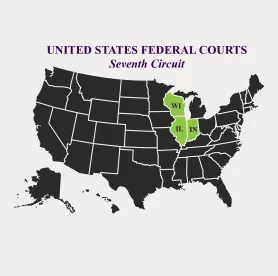Miller v. Southwest Airlines Co., 926 F.3d 898 (7th Cir. 2019)
Seventh Circuit holds that union member claims under the Biometric Information Privacy Act could not proceed in court.
This case considered two consolidated appeals posing the same question: “whether persons who contend that air carriers have violated state law by using biometric identification in the workplace must present these contentions to an adjustment board under the Railway Labor Act (RLA), 45 U.S.C. §§ 151-188, which applies to air carriers as well as railroads.” 926 F.3d at 900.
Both actions arose from Illinois’ Biometric Information Privacy Act (BIPA), which imposes restrictions before a private entity, including an employer, can obtain and store biometric information – including information gleaned from fingerprints. Id. Generally speaking, a private entity cannot collect biometric information without disclosing certain information to and receiving consent from “the subject or the subject’s legally authorized representative.” 740 ILCS 14/15.
In both cases, plaintiffs asserted that defendants had implemented a timekeeping system requiring workers to clock in and out with their fingerprints “without their consent, fail[ing] to publish protocols, and us[ing] third-party vendors to implement the systems, which plaintiffs call a forbidden disclosure.” Id. at 901. The question boiled down to whether the dispute was properly heard in federal courts or in front of an adjustment board under the Railway Labor Act. Id. at 903.
The Seventh Circuit held that “how workers clock in and out is a proper subject of negotiation between unions and employers” and is, in fact, “a mandatory subject of bargaining.” Id. “When a subject independent of collective bargaining arises, and concerns different treatment of different workers, litigation may proceed outside the scope of the Railway Labor Act.” Id. at 904. In this case, however, the questions raised are “about how an air carrier acquires and uses fingerprint information for its whole workforce.” Id. Such a question cannot be resolved without asking whether the union has consented on behalf of the employees. Id. For this reason, the Seventh Circuit ruled that the dispute had to be decided by an adjustment board.
Because BIPA class actions often come up in the employment context, this holding, which appears to preclude federal jurisdiction of BIPA class actions where the plaintiff is a union member, is significant.
Nielen-Thomas v. Concorde Inv. Servs., LLC, 914 F.3d 524 (7th Cir. 2019)
Seventh Circuit clarifies meaning of “covered class action” under SLUSA.
This case was a putative class action alleging mismanagement of financial accounts and investment portfolios by multiple investment advisory firms and a broker. Bringing nine different state-law claims on behalf of the putative class, the named plaintiff alleged violations of Wisconsin and Nebraska securities laws and claims for breach of contract, fraud, negligence, failure to supervise, and breach of fiduciary duty, among other claims. 914 F.3d at 527. After the defendants removed the case, defendants successfully moved to dismiss plaintiff’s nine state-law claims. In granting dismissal with prejudice, the district court held that the claims were precluded by the Securities Litigation Uniform Standards Act of 1998 (SLUSA), finding that, even though the proposed suit was not a “covered class action” under subsection I of SLUSA because the class consisted of fewer than 50 members, the lawsuit was still a “covered class action” under subsection II because the action was brought on behalf of unnamed parties in a representative capacity under SLUSA. Id.
On appeal, the Seventh Circuit affirmed the dismissal with prejudice. Id. at 535. The opinion assessed the plain language and legislative history of SLUSA to determine that subparagraphs I and II provide two conceptions of lawsuits deemed “covered class actions” under SLUSA: (I) lawsuits that identify more than 50 plaintiffs but where no plaintiff seeks damages in a representative capacity, and (II) all putative class actions with 50 or fewer proposed class members. Id. at 531. Although plaintiff argued that a collection of Supreme Court and Seventh Circuit holdings indicated that class actions brought by fewer than 50 plaintiffs were not covered under SLUSA, the court ruled that these holdings were non-binding dicta, finding the courts in these cases did not have the opportunity to rule on the context in which Subparagraphs I and II applied. Id. at 534.
The opinion solidifies the broad reach of “covered class actions” under SLUSA to include all putative class actions with fewer than 50 proposed class members.
Casillas v. Madison Ave. Assocs., Inc., 926 F.3d 329 (7th Cir. 2019)
Seventh Circuit holds that omitting information required by the Fair Debt Collection Practices Act (FDCPA) was not enough for standing.
The FDCPA requires debt collectors to notify consumers about the process that the statute provides for verifying a debt. In this case, the defendant sent Casillas a debt-collection letter that described the process, but failed to specify that she had to communicate in writing to trigger the statutory protections. Casillas, 926 F.3d at 331. Casillas then filed a putative class action based on the omission. Id. The district court dismissed the complaint, finding that without an allegation of harm, there was no standing. Id. at 332–33.
The Seventh Circuit, in an en banc decision, affirmed. Id. at 334. The court noted that “Casillas did not allege that [defendant’s] actions harmed or posed any real risk of harm to her interests under the [FDCPA].” Id. “She did not allege that she tried to dispute or verify her debt orally and therefore lost or risked losing the statutory protections. Indeed, she did not allege that she ever even considered contacting [defendant] or that she had any doubt about whether she owed … the stated amount of money.” Id. Instead, she “complained only that her notice was missing some information that she did not suggest that she would ever have used.” Id. In the court’s view, “Casillas had no more use for the notice than she would have had for directions accompanying a product that she had no plans to assemble.” Id. Distinguishing other cases, the court concluded that the alleged omission was nothing more than a procedural violation that failed to place the plaintiffs in any real harm. Id.
This opinion is significant largely because it highlights a split between the Sixth and Seventh Circuits, one exemplified by the division between the majority and dissent of the en banc decision itself. The Sixth Circuit has held that the same omission places individuals at a greater risk of falling victim to abusive collection practices. Id. at 335–36 (citing Macy v. GC Services Limited Partnership, 897 F.3d 747 (6th Cir. 2018)).
Rosenbach v. Six Flags Entertainment Corp., 2019 IL 123186, 129 N.E.3d 1197 (Ill. 2019)
Illinois Supreme Court holds that actual injury not required to bring a claim under the Biometric Privacy Information Act (BIPA).
Defendants own and operate an amusement park and sell “repeat-entry passes” that entitle the holder to admission to the park throughout the season. Since 2014, “defendants have used a fingerprinting process when issuing those passes.” 2019 IL 123186, at 4. This system relies on the fingerprints of pass holders to verify customer identities and, for that purpose, collects and stores biometric information gleaned from the pass holders’ fingerprints. Id. Plaintiffs sued for alleged violations of the BIPA, and defendants argued that, to state a claim, a plaintiff must plead an actual injury – that is to say, some injury beyond the mere statutory violation of BIPA. Id. at 15.
Rejecting defendants’ argument, the Illinois Supreme Court held that “a person need not have sustained actual damage beyond violation of his or her rights under the Act in order to bring an action under it.” Id. at 28. BIPA defendants “who fail to follow the statute’s requirements” will be subjected “to substantial potential liability, including liquidated damages, injunctions, attorney fees, and litigation expenses ‘for each violation’ of the law whether or not actual damages, beyond violation of the law's provisions, can be shown.” Id. at 36 (internal citations omitted).
Joiner v. SVM Management, No. 1-17-2336, 2019 IL App (1st) 172336-U (Ill. App. Ct. 2019)
Court of Appeal confirms that class actions in Illinois state court still can be mooted by tendering an offer of complete relief.
In this case, plaintiffs brought a putative class action based on a landlord’s failure to repay a security deposit at the end of a lease agreement. Before plaintiffs filed a motion for class certification, defendant delivered a cashier’s check to plaintiffs providing the amount of the security deposit along with a letter stating that defendant “unconditionally tenders” the security deposit in addition to “[a]ll court costs and reasonable attorney’s fees as allowed by the court that Plaintiffs incurred in pursuing Count I of the complaint.” 2019 IL App (1st) at ¶ 7.
Plaintiffs argued that under Campbell-Ewald Co. v. Gomez, 577 U.S., 136 S. Ct. 663 (2016), an unaccepted settlement offer – even a tender of the full amount owed – has no force, and thus because plaintiffs rejected the tender offer, it is null and void and cannot moot the case. Defendant pointed to Barber v. American Airlines, Inc., 241 Ill. 2d 450, 948 N.E.2d 1042, 350 Ill. Dec. 535 (2011), in which the Illinois Supreme Court held that “even rejected offers can moot a claim.”
Ultimately, despite changes in how the Seventh Circuit treats similar tenders under Campbell-Ewald, the Illinois Appellate Court found that “until our supreme court says otherwise, Barber and Ballard remain the controlling authority in Illinois.” 2019 IL App (1st) at ¶ 28. Thus, in Illinois courts, a class action lawsuit still can be mooted by a tender offer made before a motion for class certification.
Part of the Fall 2019 Class Action Litigation Newsletter available here.




 />i
/>i
